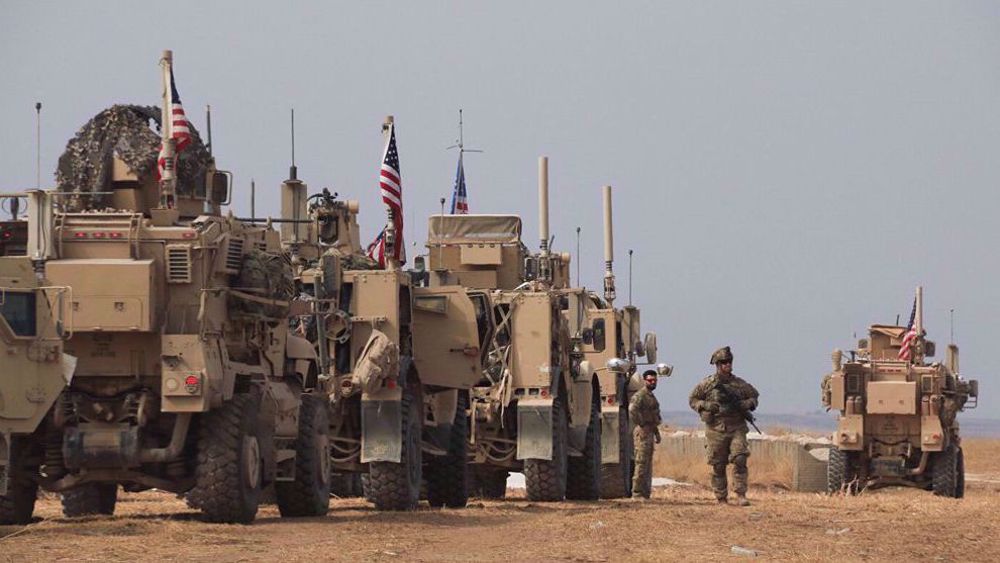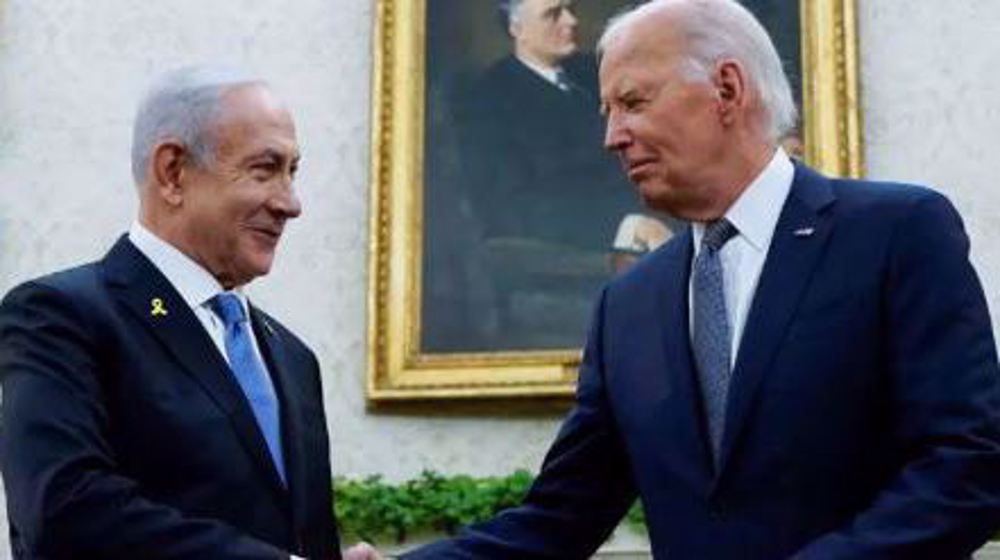Carter accuses Russia of 'nuclear saber-rattling'
US Defense Secretary Ashton Carter has criticized Russia for what he described as “nuclear saber-rattling” and pledged to continue a robust military buildup on NATO’s eastern flank to deter the Russian “aggression.”
“Moscow’s nuclear saber-rattling raises troubling questions about Russia’s leaders’ commitment to strategic stability, their respect for norms against the use of nuclear weapons, and whether they respect the profound caution that nuclear-age leaders showed with regard to brandishing nuclear weapons,” he said Tuesday.
Carter said the NATO alliance would “keep the door open for Russia” for cooperation on global security challenges but it was up to Moscow to decide.
“We don't seek a cold, let alone hot, war with Russia. We don't seek to make Russia an enemy,” he said. “But make no mistake; we will defend our allies, the rule-based international order and the positive future it affords us.”
The Pentagon chief made the remarks at a ceremony in the western German city of Stuttgart in which he presided over the change of command for US European Command.
Army General Curtis Scaparrotti, commander of US forces in South Korea, will take over from Air Force General Philip Breedlove, assuming a post that traditionally also makes him the supreme allied commander of NATO's European forces.

Scaparrotti will have to handle NATO’s tense relationship with Russia, which has deteriorated over the Ukraine crisis and the Russian bombing campaign in support of President Bashar al-Assad in Syria.
“We're moving from assurance to deterrence … moving from assurance to war-fighting posture,” a senior Pentagon official said.

In brief remarks, Scaparrotti said NATO faced “challenges to international law” by Russia. “We also face the immediate threat that terrorism poses as the world witnessed in the recent tragedies in Brussels, Paris and Ankara,” he said.
“And we face the significant influx of migrants and refugees that are challenging the social fabric of Europe,” the general added.
US officials accuse Russia of flexing its military muscles in Ukraine and Syria and provocative interactions with US armed forces.
In the latest such encounters on Friday, a Russian Sukhoi Su-27 performed a “barrel roll” maneuver over a US reconnaissance aircraft flying over the Baltic Sea.

The incident came a day after Russia scrambled a Mig-31 supersonic jet to intercept a US Navy P-8 spy aircraft over Russia’s Far East.
It mirrored a similar interaction in mid-April and two encounters earlier in the month between the USS Donald Cook Navy destroyer and Russian aircraft in the Baltic Sea. NATO’s Baltic members have been riled up by the acts.
In March, Carter pledged that about 4,000 troops plus military equipment would deploy to Europe early next year.
The efforts follow President Barack Obama's latest budget proposal, which includes a $3.4 billion request to strengthen US support for NATO and place an additional US army brigade in Eastern Europe.
“NATO continues to be a linchpin, a cornerstone of US security policy,” Obama said alongside NATO Secretary General Jens Stoltenberg at the White House last month.

US military experts have warned that the Baltic Sea has become increasingly unsafe for the American military forces there because of the military encounters with Russia.
“Since the end of the Cold War, the US military has never really had to fight an enemy that had its own arsenal of precision-guided weapons,” Mark Gunzinger, senior fellow at the US Center for Strategic and Budgetary Assessments, was quoted by The Hill as saying on Saturday.
“It was able to use air bases and other bases located fairly close to the borders of an enemy because there wasn't that much of an air and missile threat to those bases,” he noted. “That is changing.”
On April 27, the US Air Force deployed two of its most advanced jets in Lithuania in Eastern Europe for the first time in a show of support for the region. The F-22 fighter jets had previously visited Poland, Estonia, and Romania.
The Baltic states of Estonia, Latvia and Lithuania were formerly ruled by the Soviet Union. They joined NATO and the European Union in 2004.
Last year, the US delivered over 100 pieces of heavy military equipment to the Baltic states to provide them with the ability to “deter” the perceived threat from Russia.

The Baltics also asked NATO to permanently deploy up to 5,000 troops as a deterrent, a request that is still under consideration.
Admiral Mark Ferguson, commander of US Naval Forces in Europe, told CNN in April that Russia was deploying new submarines that are harder for the US Navy to track and detect.
The warning came as US intelligence officials raised concerns that Russian submarines, with a significant and unsettling capability, could cut critical undersea communications cables between the US and Europe, in the event of a conflict.
NATO has established a high-speed response force complete with forward command and logistics centers in its eastern members to counter Russia.

Moscow has expressed concern about NATO's eastward expansion close to Russia's borders. “NATO borders are getting closer to Russia, not the opposite,” Foreign Minister Sergei Lavrov said in an interview with the Swedish newspaper Dagens Nyheter late last month.
“NATO military infrastructure is inching closer and closer to Russia’s borders. But when Russia takes action to ensure its security, we are told that Russia is engaging in dangerous maneuvers near NATO borders,” he added.
Lavrov further noted that NATO’s deployment of anti-missile systems and troops near Russian frontiers are in violation of a 1997 pact with Russia known as NATO-Russia Founding Act, which defines the goals and mechanism of consultation, cooperation and joint decision-making as the core of mutual relations between the Western security alliance and Russia.
NATO’s Baltic members and Poland, however, argue that Russia has already violated the act and that the alliance is no longer obliged to stick to the agreement.
VIDEO | Press TV's news headlines
VIDEO | US-Israeli genocide: Will Gazans see ceasefire deal achieved?
VIDEO | Grief strikes Parachinar: 44 lives lost in terror attack
VIDEO | Yemen’s armed forces target Israeli airbase amid nationwide pro-Palestinian rallies
Putin vows more test of new hypersonic missile
VIDEO | Jordanians continue rallies to denounce Israeli genocide in Gaza, Lebanon
6 Israeli soldiers commit suicide: Reports
Diplomat discourages recourse to pressure, intimidation, confrontation against Iran















 This makes it easy to access the Press TV website
This makes it easy to access the Press TV website